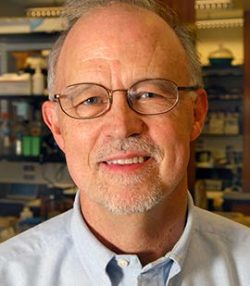THE ZACHARY AND ELIZABETH M. FISHER PROFESSORSHIP IN ALZHEIMER’S AND DEGENERATIVE DISEASE
Sidney Strickland, Ph.D., Professor

A biochemist by training, Sidney Strickland Ph.D. is our Zachary and Elizabeth M. Fisher Professor in Alzheimer’s and Neurodegenerative Disease. Dr. Strickland and his team are working towards reconceptualizing Alzheimer’s disease as an amalgam of dysfunctions rather than one pathology, much like how knowledge of cancer has changed in recent decades.
Prior to joining The Rockefeller University, Strickland spent 18 years leading a lab at Stony Brook focused on the circulatory system. He is currently researching how impairment to the brain’s blood supply could be a contributing factor in how Alzheimer’s disease progresses.
Dr. Strickland’s focus on the cerebrovascular system’s role in neurodegenerative disorders was often seen as unconventional when he began.
Substantial evidence now suggests that Alzheimer’s pathology involves disruption of the elaborate network of blood vessels that supplies oxygen and glucose to the brain. Alzheimer’s patients often suffer from altered cerebral blood flow, damaged cerebral vasculature, and abnormal blood clotting. In addition, many epidemiological studies have linked vascular diseases such as stroke, atherosclerosis, atrial fibrillation, and hypertension with an increased risk for Alzheimer’s disease.
The overarching idea guiding Dr. Strickland’s work is that the abnormal amyloid-beta proteins associated with Alzheimer’s disease are also intricately linked to fibrinogen, a protein that leads to blood clots in the small vessels of the brain when converted to fibrin.
In turn, microinfarcts, or microscopic strokes, can lead to neuronal death and deteriorating brain function. This has direct therapeutic implications as it suggests that modulating the clotting system could alter or slow down the clinical course of Alzheimer’s patients.
Some of the latest studies coming out of the Strickland lab have focused on the contact system, a biochemical cascade that promotes blood clotting and inflammation, as a potential target for therapy of Alzheimer’s disease. One potential target molecule in this system is high-molecular weight kininogen (HK). They have found that even small changes in the activity of the contact system will produce significant increases in the level of HK cleavage, or the chemical reaction that separates the molecule into two parts. Based on the evidence gathered so far, the Strickland lab has been studying cleavage of HK as a potential biomarker for very early-stage Alzheimer’s disease. This could mean that a simple-to-administer blood test may eventually be able to detect signs of the disease in some patients.
Turning to potential therapeutic avenues, the team has developed monoclonal antibodies targeting HK. A recent paper published in Blood Advances shows that an anti-HK antibody inhibited blood clotting and inflammatory pathways in animal models. Subsequent research is planned to assess their potential value as antibody treatments that could help a subset of Alzheimer’s patients.
Looking Ahead
One of the primary roadblocks to treating Alzheimer’s effectively is the difficulty of determining the form of the disease at early stages, before significant memory loss and other cognitive symptoms begin to emerge.
“Alzheimer’s disease is complex and multifactorial. We need to identify which pathologies patients have so we can individualize treatment. Then we can start to have a significant effect on the disease“ Strickland said.
Dr. Strickland’s work has built a foundational understanding of how the vascular system is interlinked with Alzheimer’s. He and his team will further explore basic biology and cellular mechanisms related to pathology, with an eye on how those insights may be applied clinically.
A Strong Dedication to Mentorship
Dr. Strickland recently stepped down as Dean of Graduate and Postgraduate Students and Vice President of Educational Affairs at The Rockefeller University, after 22 years in the roles. He is now focusing on his pioneering research into neurodegenerative diseases.
Under his watch, 582 young scientists received Rockefeller PhDs and 2,218 postdoctoral researchers have called Rockefeller home. Dr. Strickland also worked with faculty members to bring 17 new courses to the graduate program.
“He transformed the Rockefeller graduate school from a boutique program into what is widely acknowledged as one of the most prestigious in the world,” said colleague Jeffrey M. Friedman, M.D., Ph.D.
Strickland was himself a Rockefeller trainee nearly 50 years ago as a postdoc in the lab of Edward Reich before becoming a tenured faculty member at the State University of New York at Stony Brook. He returned to Rockefeller in 2000 to take on the role of dean.
Over the years, the university community has benefited greatly from his leadership and guidance. “Rockefeller is so very fortunate to have had Sid watching over our students and postdocs through the first two decades of the 21st century, a period of rapid progress and enormous changes in biomedical research,” said university president Richard P. Lifton, M.D., Ph.D.







